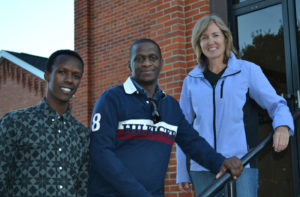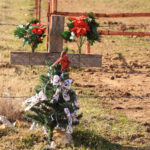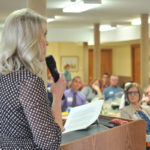By Lindsay Steele
The Catholic Messenger
Julie Marner’s first experience helping the impoverished, often undereducated young people in Burundi in 2011 was life-changing.

Julie Marner, right, poses for a picture with Burundian English teacher Fabrice Bizimana, left, and Burundi Friends International board member Thierry Yungenge at St. Joseph Parish in Hills last month.
“There’s something about Burundians that I haven’t discovered anywhere else,” said Marner, a native of St. Joseph Parish in Wellman and currently a resident of California. “They have such great hope and perseverance. They have a faith that is remarkable. They’re a great inspiration to me on how to live, especially in a country where we have everything we need, and often the things we want.”
Burundi is a mostly Catholic country of about 10.5 million residents in central Africa. Its citizens live amongst constant political turmoil and poverty. “They are number one on the Global Hunger Index,” Marner said. “It’s extremely alarming. Most people are hungry there and actively malnourished.”
Jobs are hard to come by in Burundi, she said, as are educational opportunities. Still, of the 2 percent of Burundians who do graduate from college, only about half will find work.
Through Burundi Friends International (BFI), a California-based organization aimed at helping fight poverty in Burundi by providing education, healthcare and economic empowerment opportunities, Marner taught English. She said learning English can help open many doors for young Burundians.
Marner, who works full-time as a parish music director near San Diego, has returned to Burundi several times since her first visit. She has taken on a leadership role in the ever-growing Burundi Friends International. She serves as president and chairperson of fundraising.
Because of work obligations and the fact that she pays for most of her Burundi trips out-of-pocket, she isn’t able to go to the country as often as she’d like. She tries to make the most of the two weeks a year she generally spends there. In the past six years, she and other BFI volunteers have established a network of Burundians who do most of the English teaching. That allows Marner to focus on other aspects of helping develop opportunities for young people.
“We’ve been expanding the distribution of medical equipment. There are always new projects to develop. Economic empowerment is one – we contribute goats to coffee-growers, which provide fertilizer and added income with dairy production. Most families have about six kids, so it helps families with sustainability,” she said.
BFI is working to provide bicycles to Burundian English teachers so they can expand their outreach. They’re also working to put teachers in contact with smart phones for limitless access to informational resources and to find creative ways to use their skills. “Entrepreneurship seems to be the next step,” Marner said. “Some get jobs as translators.”
In the process of helping Burundians, Marner realizes that Burundians have helped her, too. They’ve offered her constant inspiration and perspective, especially when it comes to matters of faith. “(As Americans) we plan the best we can. We plan retirement. They are just planning on how to feed their kids. They have faith it will happen … they have faith that God will provide a way and they practice that faith daily
“I live a more simple life every time I come back. It makes me want to clear out my house and give my possessions to people who need them.”
International
Burundi Friends International (BFI) was started by a group who met at a women’s retreat in 2007. One of the women, who grew up in Burundi, expressed her dream of helping her country out of poverty. With that, BFI was born.
Its mission is to help fight poverty in Burundi by providing education, healthcare and economic empowerment opportunities.
BFI is described as a small but passionate group working to fulfill those three pillars that form its foundation, as they play a crucial role in directing the projects undertaken. BFI hopes to be an ambassador to the people of Burundi in voicing their existence, state of life, and obtaining and providing assistance that will lead to a future of greater stability.
Board members periodically visit Burundi to determine the needs of the people that align with the board’s mission. In the U.S., projects are developed based on those assessments, in partnership with governments and other nonprofits if and when necessary. BFI also raises funds and recruits volunteers.











